Abstract
Objective
To test the validity of using assumed oxygen consumption for Fick cardiac output during administration of epoprostenol.
Methods
In 24 consecutive patients Fick cardiac output calculated with assumed oxygen consumption according to LaFarge and Miettinen (COLM) and according to Bergstra et al. (COBE) were compared with thermodilution cardiac output (COTH). Pulmonary vascular resistance (PVR) was calculated with each cardiac output (CO) value. If PVR exceeded 200 dyne.s.cm-5, administration of epoprostenol (Ep) was started, and at maximal dose the above-mentioned measurements were repeated.
Results
In all 24 patients COBE agreed significantly with COTH, mean difference -0.145 1.min-1, 95% confidence interval (CI) -0.402 to 0.111, limits of agreement (LA) -1.336 to 1.045. COLM was significantly lower than COTH, -1.165 1.min-1, p<0.05, 95% CI -1.510 to -0.819, LA -2.768 to 0.438. In 16 patients (67%) administration of epoprostenol was indicated. During Ep infusion the CO values calculated with oxygen consumption according to LaFarge and Miettinen (EpCOLM) were also significantly lower than thermodilution CO (EpCOTH), mean difference -1.281 1.min-1, p<0.05, 95% CI -1.663 to -0.900, LA -2.685 to 0.122. The agreement of CO values calculated with oxygen consumption according to Bergstra et al. (EpCOBE) and EpCOTH remained, mean difference -0.115 1.min-1, 95% CI -0.408 to 0.178, LA -1.191 to 0.962.
Conclusion
Before as well as during administration of epoprostenol, it is justified to use CO values calculated with oxygen consumption according to Bergstra et al. instead of thermodilution CO; CO values calculated with oxygen consumption according to LaFarge and Miettinen show significant underestimation.
Keywords: cardiac output, epoprostenol, oxygen consumption, pulmonary hypertension, pulmonary vascular resistance, thermodilution
Full text
PDF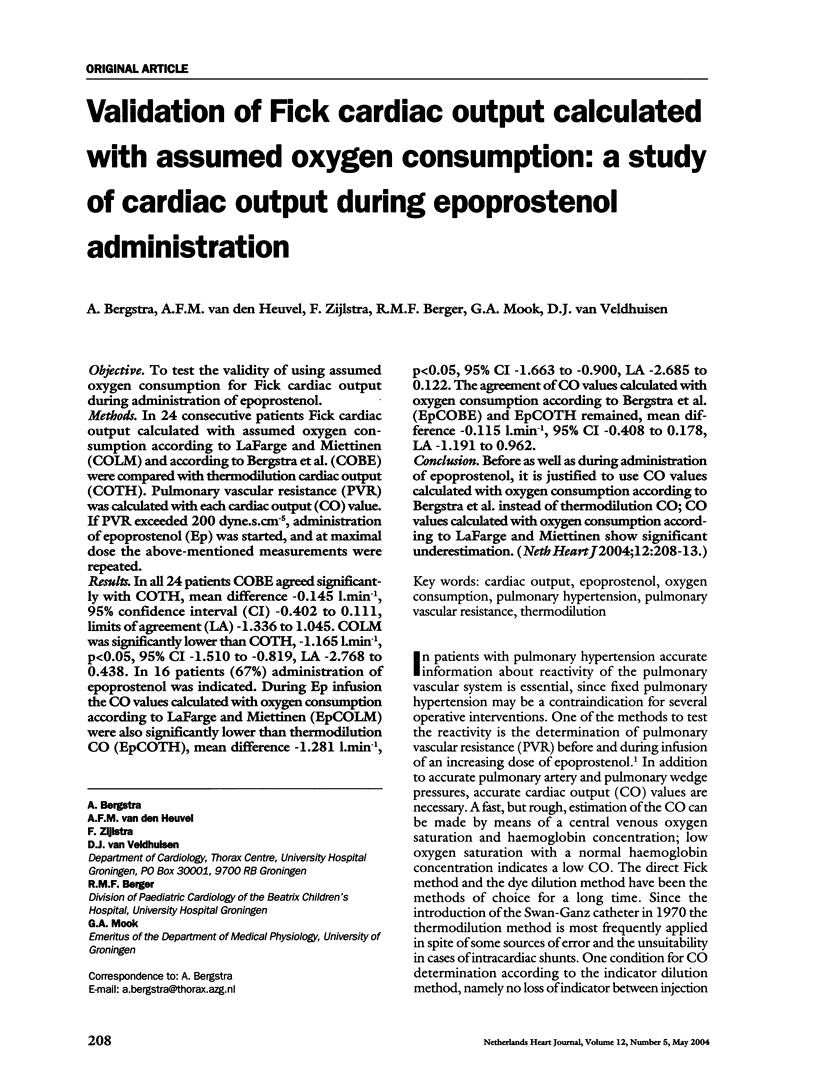
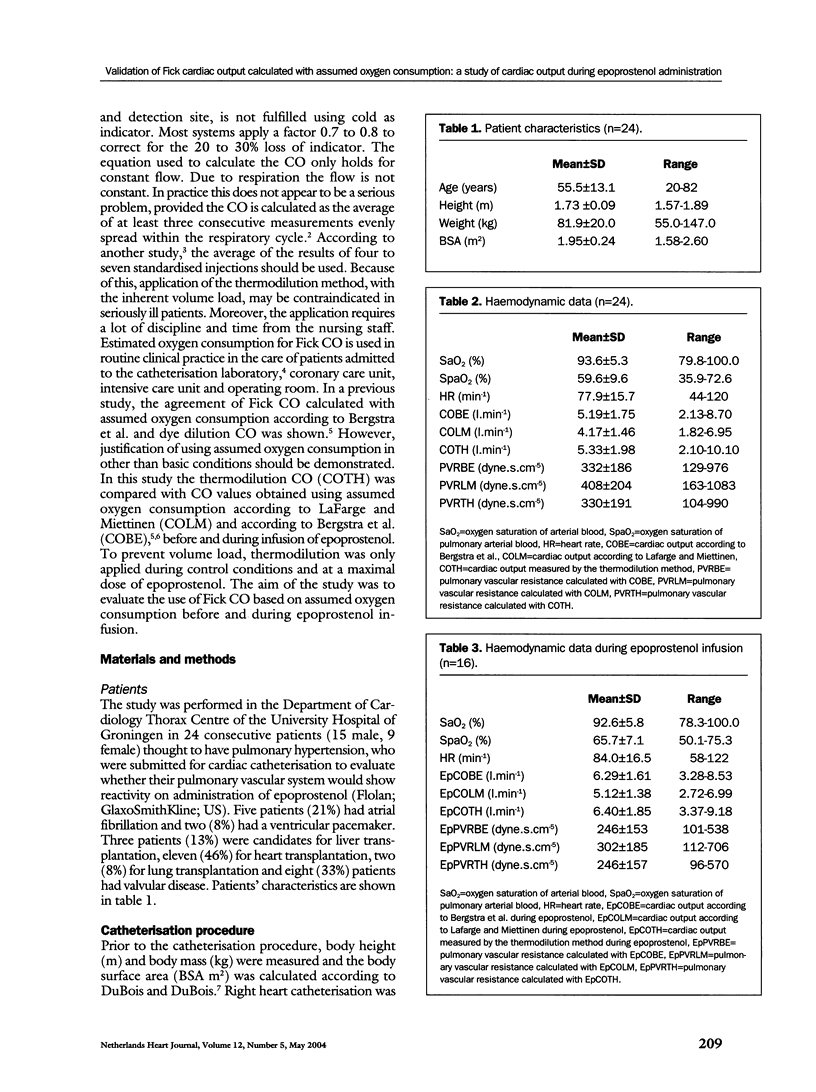
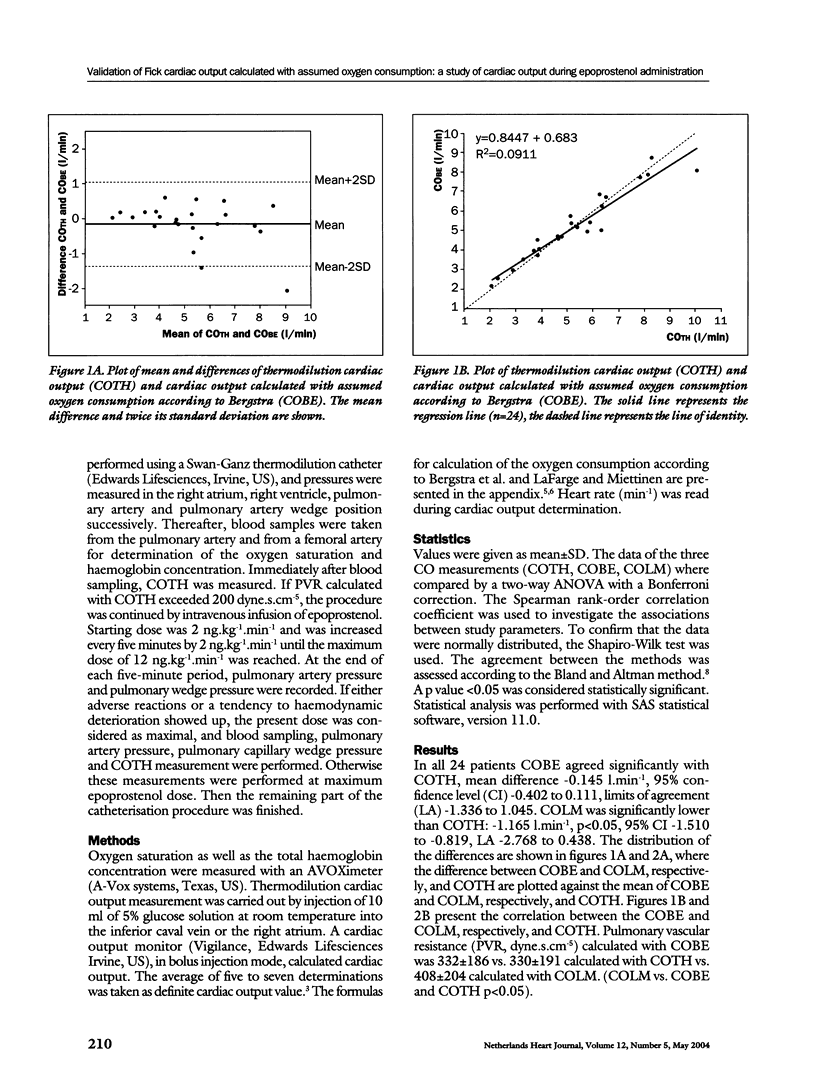
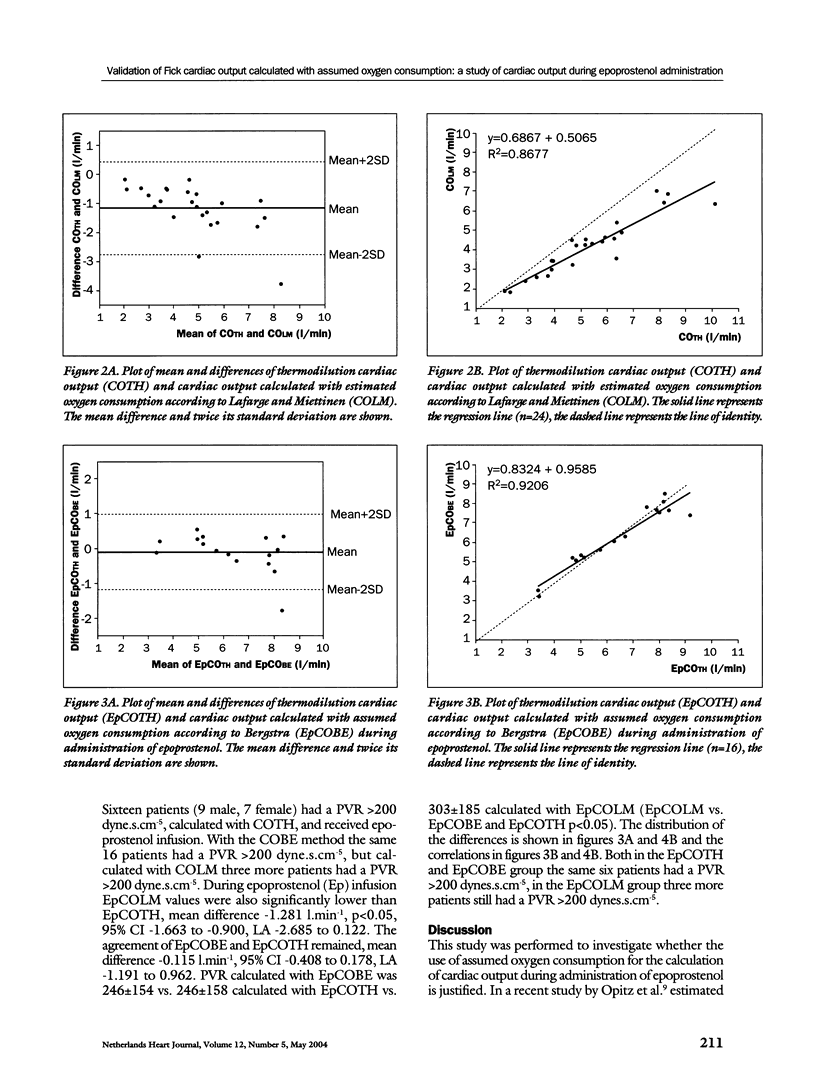
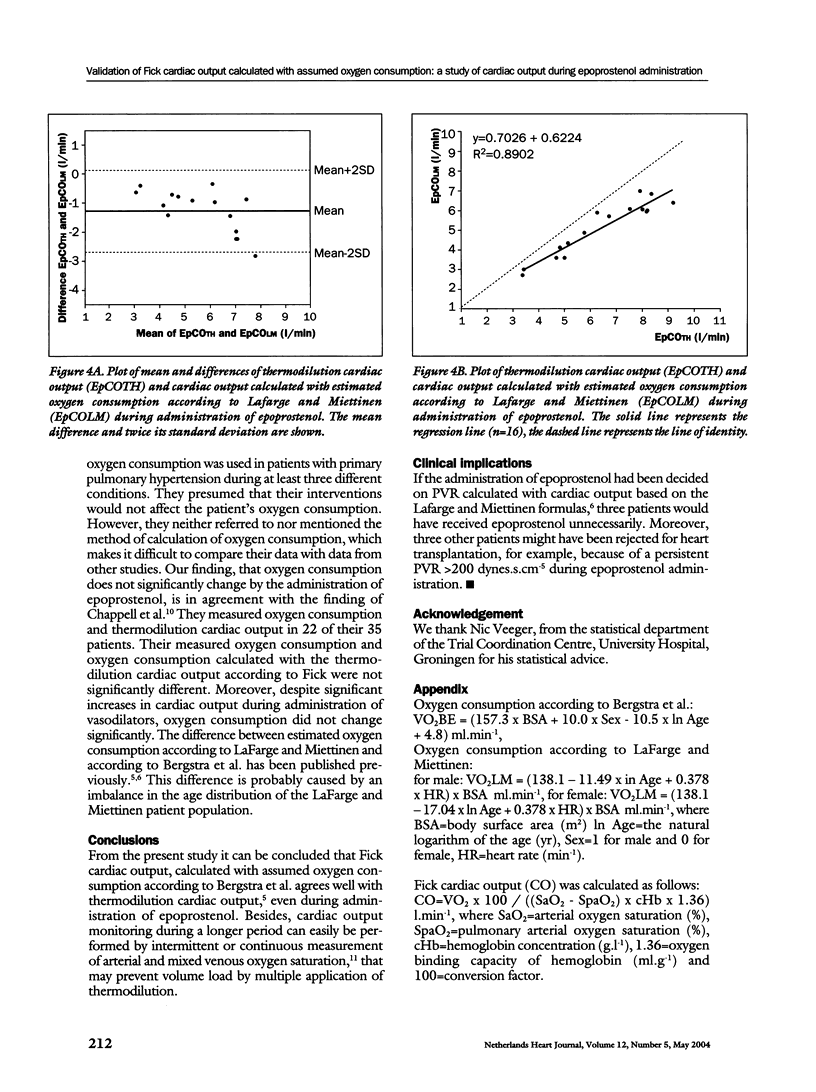
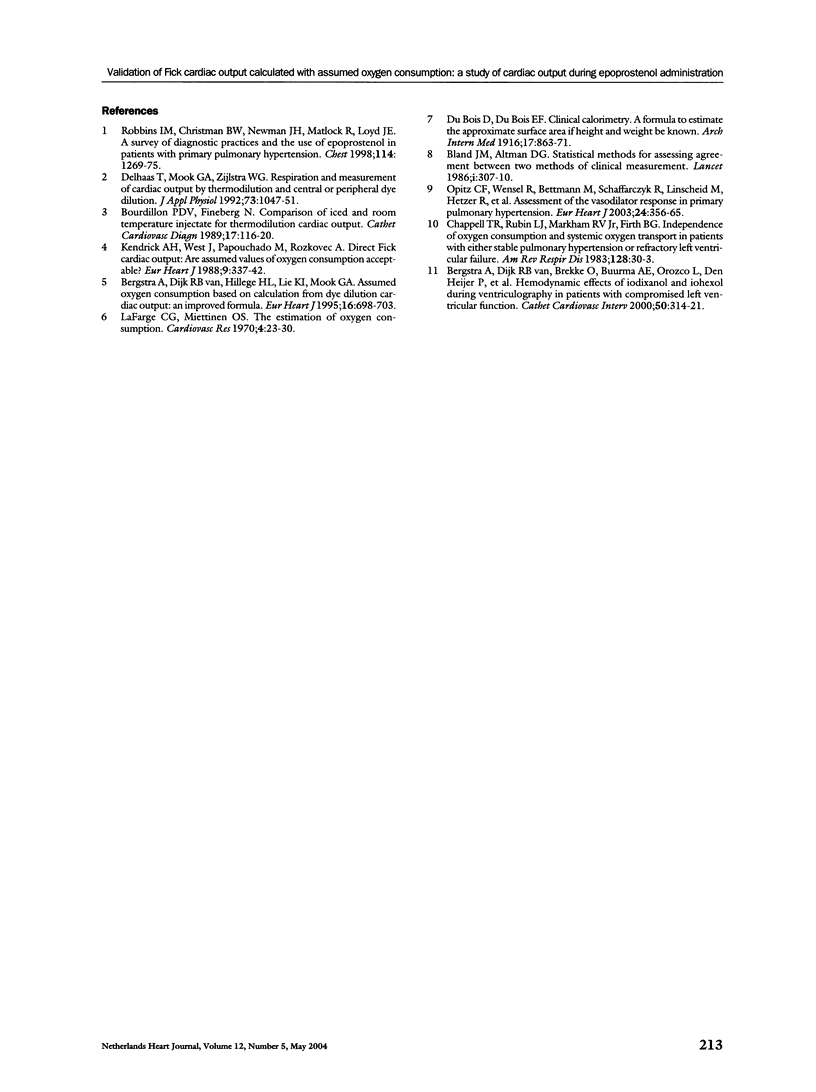
Selected References
These references are in PubMed. This may not be the complete list of references from this article.
- Bergstra A., van Dijk R. B., Brekke O., Buurma A. E., Orozco L., den Heijer P., Crijns H. J. Hemodynamic effects of iodixanol and iohexol during ventriculography in patients with compromised left ventricular function. Catheter Cardiovasc Interv. 2000 Jul;50(3):314–321. doi: 10.1002/1522-726x(200007)50:3<314::aid-ccd9>3.0.co;2-d. [DOI] [PubMed] [Google Scholar]
- Bland J. M., Altman D. G. Statistical methods for assessing agreement between two methods of clinical measurement. Lancet. 1986 Feb 8;1(8476):307–310. [PubMed] [Google Scholar]
- Bourdillon P. D., Fineberg N. Comparison of iced and room temperature injectate for thermodilution cardiac output. Cathet Cardiovasc Diagn. 1989 Jun;17(2):116–120. doi: 10.1002/ccd.1810170213. [DOI] [PubMed] [Google Scholar]
- Chappell T. R., Rubin L. J., Markham R. V., Jr, Firth B. G. Independence of oxygen consumption and systemic oxygen transport in patients with either stable pulmonary hypertension or refractory left ventricular failure. Am Rev Respir Dis. 1983 Jul;128(1):30–33. doi: 10.1164/arrd.1983.128.1.30. [DOI] [PubMed] [Google Scholar]
- Delhaas T., Mook G. A., Zijlstra W. G. Respiration and measurement of cardiac output by thermodilution and central or peripheral dye dilution. J Appl Physiol (1985) 1992 Sep;73(3):1047–1051. doi: 10.1152/jappl.1992.73.3.1047. [DOI] [PubMed] [Google Scholar]
- LaFarge C. G., Miettinen O. S. The estimation of oxygen consumption. Cardiovasc Res. 1970 Jan;4(1):23–30. doi: 10.1093/cvr/4.1.23. [DOI] [PubMed] [Google Scholar]
- Robbins I. M., Christman B. W., Newman J. H., Matlock R., Loyd J. E. A survey of diagnostic practices and the use of epoprostenol in patients with primary pulmonary hypertension. Chest. 1998 Nov;114(5):1269–1275. doi: 10.1378/chest.114.5.1269. [DOI] [PubMed] [Google Scholar]


